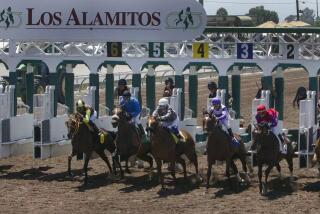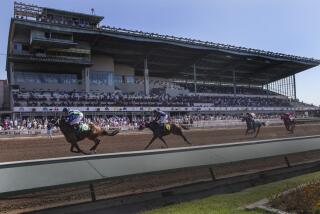Polo player ties horse deaths to supplement
- Share via
FORT LAUDERDALE, FLA. — Twenty-one horses that died mysteriously before a U.S. Open polo match received a supplement that probably caused their deaths, a top player for a Venezuelan-owned team told a newspaper, prompting the Food and Drug Administration to join the investigation Wednesday.
Lechuza Caracas team captain Juan Martin Nero told an Argentine newspaper, La Nacion, that the horses were given a weekly vitamin compound called Biodyl. The mixture, a combination of vitamins and minerals, is illegal to possess or use in the United States, the FDA said.
Nero said five horses did not receive the injection, and all of them are healthy.
Biodyl by itself is unlikely to have killed the prized horses, veterinary experts say, but it could have been part of a deadly, home-brew concoction whose legality could also be in question.
The horses went into distress Sunday afternoon at the International Polo Club Palm Beach fields. Fourteen died Sunday, the others Monday.
Nero told La Nacion that the horses were given Biodyl on Sunday to help them recover from wear and tear.
“We have no doubt about the origin of the problem,” Nero told the newspaper. “There were five horses that were not given the vitamin, and they’re the only ones that are fine.”
Siobhan DeLancey, spokeswoman for the FDA’s Center for Veterinary Medicine, said it is illegal to possess or use Biodyl in the United States. FDA records show agents blocked shipments as recently as October because it was “a new animal drug which is unsafe.”
Steve Dickinson, spokesman for Merial Ltd., the French-American company that makes Biodyl, said it is safe and has been used in Europe and Latin America since the 1950s. It is a combination of vitamin B12, selenium, potassium and magnesium.
“We went back many, many years, and this product has an exceedingly rare rate of adverse reactions,” Dickinson said. “From our experience, it’s less than one animal in over 2 million doses.”
Biodyl is legal in Venezuela, where the Lechuza Caracas polo team is based. The team declined to comment Wednesday.
Investigators at the University of Florida in Gainesville and a state-run lab in Kissimmee are awaiting results from blood and tissue tests after the initial necropsy results were inconclusive, said Terence McElroy, spokesman for the Florida Department of Agriculture and Consumer Services.
Dr. John Harvey, executive associate dean at the University of Florida’s College of Veterinary Medicine, said Biodyl itself shouldn’t have been fatal.
“If it’s done properly, I don’t think it’s going to kill a horse,” Harvey said. “On the other hand, if someone added stuff or made it improperly . . . those would be the concerns I would have.”
Nero, the polo team captain, hinted at that possibility, saying he thought the horses were given a typical dose Sunday, but whoever mixed or provided the drug may have made a mistake.
“For us, the suspicions are that there was something bad at the laboratory,” Nero said.
--
mdiaz@sunsentinel.com
More to Read
Sign up for Essential California
The most important California stories and recommendations in your inbox every morning.
You may occasionally receive promotional content from the Los Angeles Times.













